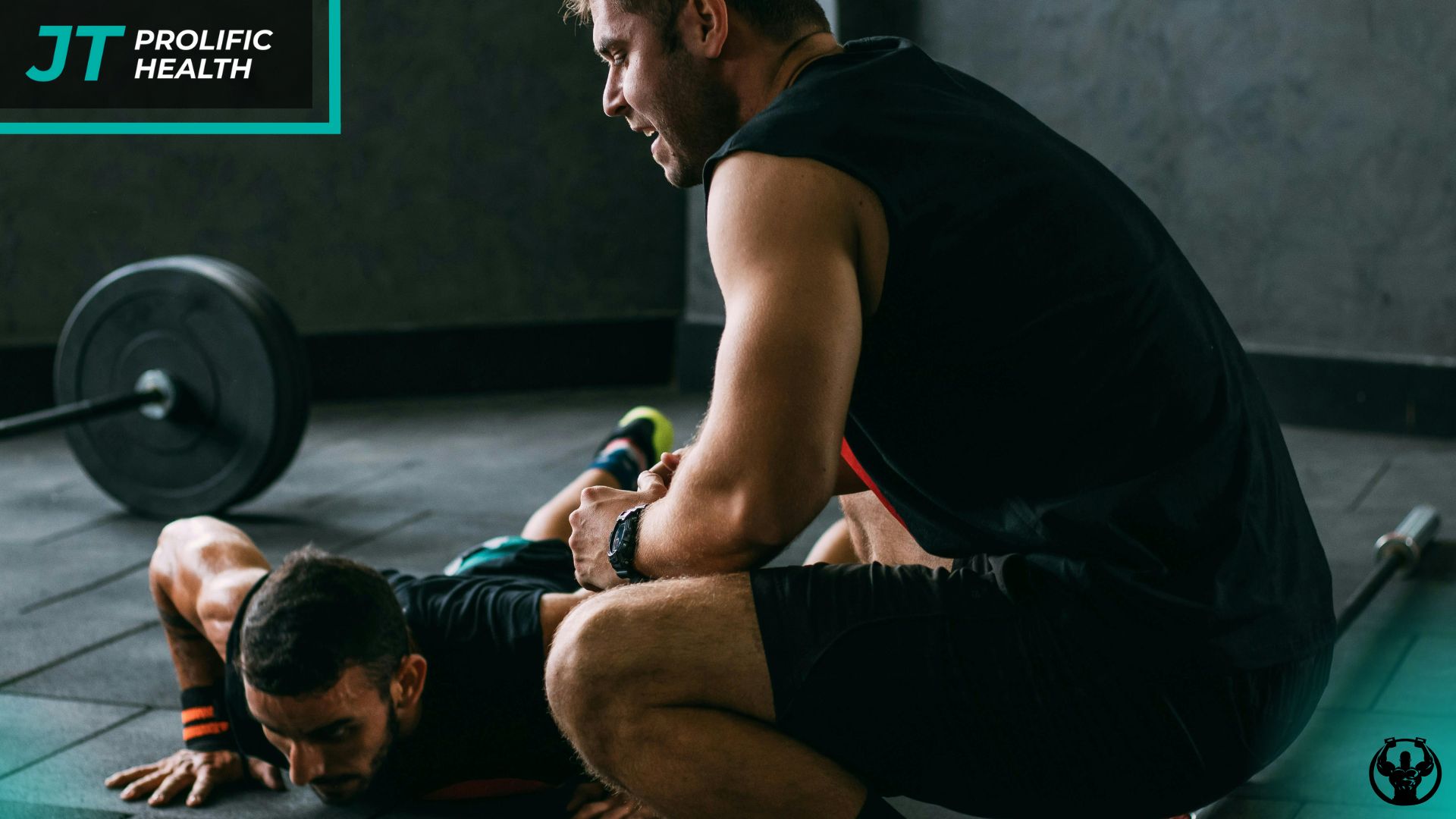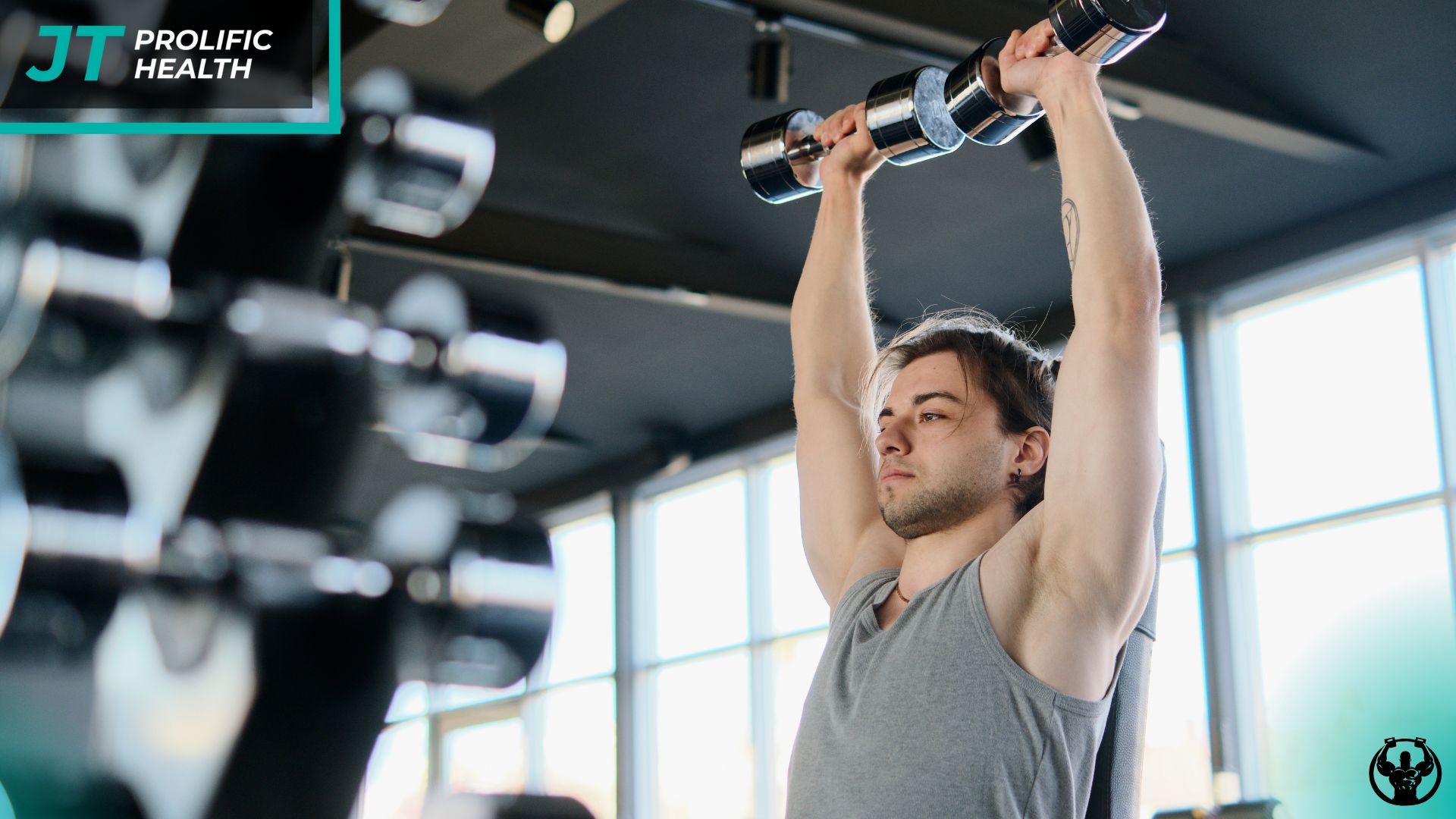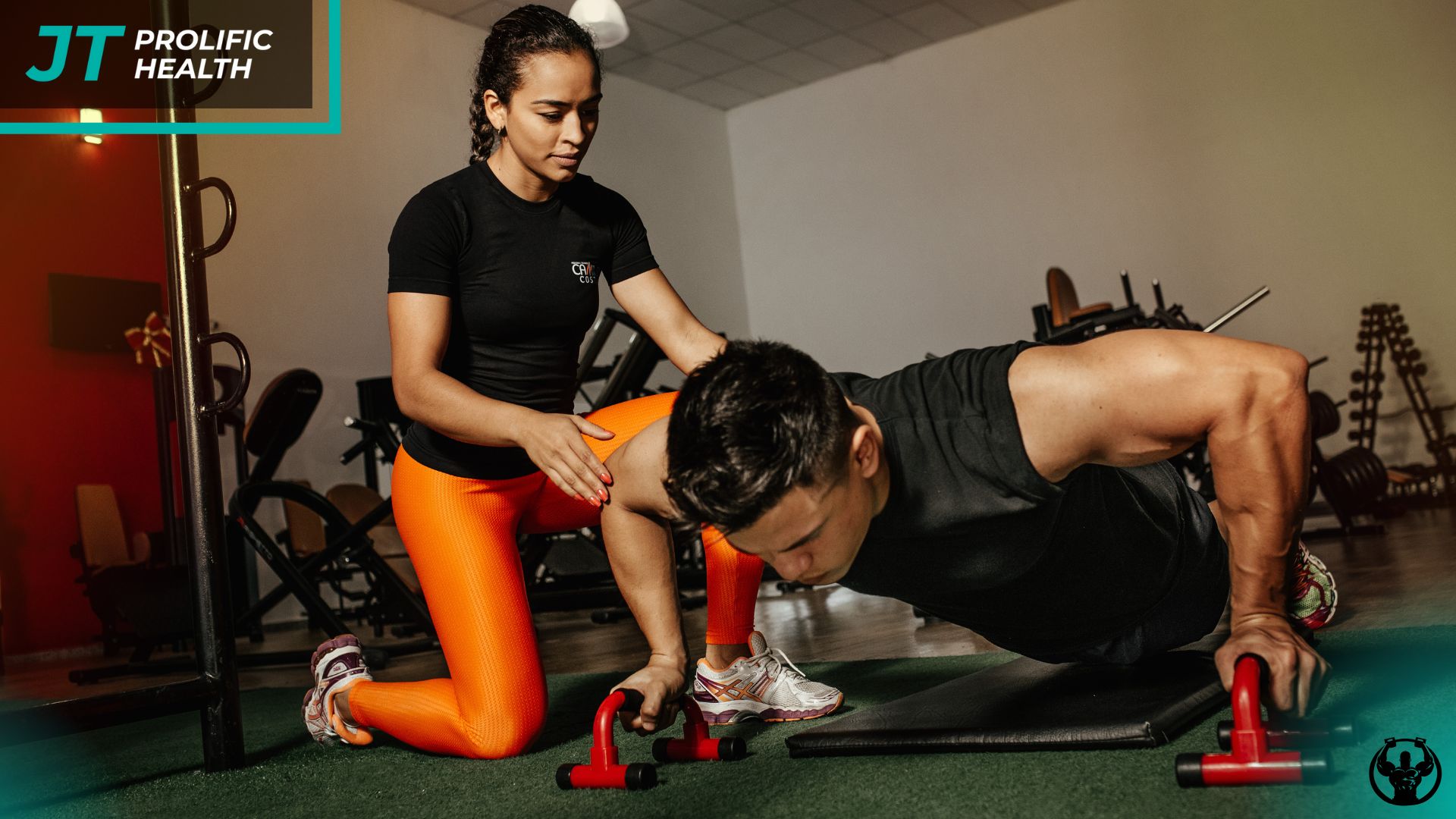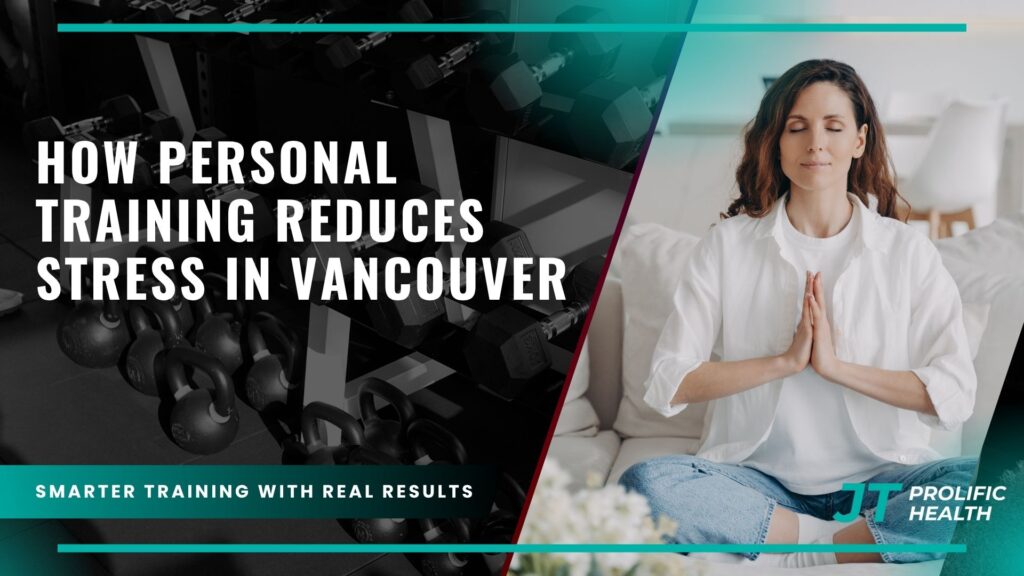In today’s fast-paced world, stress has become an unwelcome companion for many Vancouver residents. Between demanding work schedules, traffic congestion, and the pressures of urban living, finding effective ways to manage stress has never been more crucial. While traditional stress-relief methods like meditation and therapy certainly have their place, an increasingly popular and scientifically-backed approach is gaining momentum: Personal Training Reduces Stress in Vancouver.
The connection between physical exercise and mental well-being isn’t just anecdotal—it’s deeply rooted in science. When we engage in physical activity, our bodies release endorphins, often called “feel-good” hormones, which naturally combat stress and anxiety. However, the benefits of personal training for stress reduction go far beyond simple exercise. The structured, supportive environment that professional trainers provide creates a unique therapeutic experience that addresses both physical and mental health simultaneously.
Vancouver’s active lifestyle culture makes it an ideal setting for exploring how personal training reduces stress. The city’s residents are increasingly recognizing that investing in their physical health through professional guidance doesn’t just improve their fitness levels—it fundamentally transforms their ability to cope with daily stressors. Personal trainers in Vancouver have evolved their approach to encompass not just physical transformation but holistic wellness that prioritizes mental health alongside physical achievements.
The personalized nature of one-on-one training sessions creates a safe space where individuals can disconnect from external pressures and focus entirely on their well-being. This dedicated time becomes a sanctuary from the chaos of daily life, providing both immediate stress relief and long-term coping strategies. Unlike group fitness classes or solo gym sessions, personal training offers accountability, expertise, and emotional support that can be transformative for stress management.
For many Vancouver residents, the journey toward stress reduction through personal training begins with understanding that physical and mental health are intrinsically connected. When we strengthen our bodies, we simultaneously build resilience against stress, improve our sleep quality, boost our confidence, and develop healthier coping mechanisms. This comprehensive approach to wellness makes personal training an investment that pays dividends across all aspects of life.
Key Takeaways
For additional context, see this comprehensive guide.
- Endorphin Release: Personal training sessions trigger the release of endorphins, natural mood elevators that combat stress hormones like cortisol and create feelings of well-being and happiness.
- Structured Stress Relief: Regular training sessions provide a consistent outlet for stress, creating a routine that your body and mind can rely on for tension release and mental clarity.
- Improved Sleep Quality: Physical exercise through personal training enhances sleep patterns, which is crucial for stress recovery and overall mental health maintenance.
- Boosted Self-Confidence: Achieving fitness goals under professional guidance builds self-esteem and confidence, providing better tools to handle stressful situations in daily life.
- Mindfulness and Focus: Personal training sessions require present-moment awareness, naturally promoting mindfulness practices that reduce anxiety and improve mental clarity.
- Social Support System: The relationship with a personal trainer provides accountability, encouragement, and professional support that extends beyond physical fitness into emotional well-being.
- Customized Stress-Relief Strategies: Professional trainers can tailor exercise programs specifically for stress reduction, incorporating activities like yoga, breathing exercises, and low-impact movements that specifically target stress relief.
- Healthy Coping Mechanisms: Regular training sessions replace unhealthy stress-coping behaviors with positive activities that improve both physical and mental health outcomes.
Understanding the Science Behind Exercise and Stress Reduction


For additional context, see detailed information on this topic.
The relationship between physical exercise and stress reduction operates on multiple biological and psychological levels. When we engage in physical activity, our bodies undergo a complex series of chemical reactions that directly counteract the physiological effects of stress. During exercise, the brain releases endorphins, which are natural opioids that create feelings of euphoria and pain relief. These endorphins work to neutralize cortisol, the primary stress hormone that, when chronically elevated, can lead to anxiety, depression, and various health problems.
Personal training amplifies these benefits through structured, progressive exercise programs that maximize the stress-reducing potential of physical activity. Unlike random or sporadic exercise, personal training sessions are designed to maintain optimal intensity levels that promote endorphin release while avoiding overexertion that could actually increase stress levels. Professional trainers understand how to balance challenge with recovery, ensuring that each session contributes positively to stress reduction rather than adding physical stress to an already overwhelmed system.
The neurological benefits of personal training extend beyond immediate chemical responses. Regular exercise promotes neuroplasticity, the brain’s ability to form new neural connections and adapt to stress more effectively. This means that consistent personal training doesn’t just provide temporary stress relief—it actually rewires the brain to become more resilient to future stressors. Vancouver residents who commit to regular personal training often report improved stress tolerance and better emotional regulation even outside of their training sessions.
Additionally, personal training addresses the physical manifestations of stress that many people don’t realize they’re carrying. Chronic stress often results in muscle tension, particularly in the neck, shoulders, and back. Professional trainers are skilled at identifying these tension patterns and incorporating specific exercises and stretches that release physical stress while strengthening the body’s ability to maintain proper posture and alignment under pressure.
The Therapeutic Environment of Personal Training Sessions


For additional context, see our in-depth resource.
One of the most significant advantages of personal training for stress reduction lies in the therapeutic environment that these sessions create. Unlike the potentially intimidating atmosphere of crowded gyms or the isolation of solo workouts, personal training provides a safe, judgment-free space where individuals can focus entirely on their well-being. This controlled environment is particularly beneficial for Vancouver residents dealing with high-stress careers or personal challenges, as it offers a temporary escape from external pressures.
The one-on-one nature of personal training sessions allows for immediate feedback and adjustment, ensuring that each exercise is performed safely and effectively. This professional guidance eliminates the stress and anxiety that many people experience when exercising alone, particularly those who are new to fitness or returning after an injury. When individuals know they’re in capable hands, they can fully surrender to the experience and allow their minds to disconnect from daily worries.
Personal trainers also serve as informal counselors, providing emotional support and encouragement that extends beyond physical fitness. Many clients find that the supportive relationship with their trainer becomes a crucial component of their stress management strategy. The regular check-ins, goal-setting sessions, and celebration of achievements create a positive feedback loop that reinforces healthy coping mechanisms and builds resilience against stress.
The structured nature of personal training sessions also provides predictability and routine, which are essential elements for stress management. Knowing that there’s a dedicated time and space for stress relief helps individuals better manage their schedules and priorities. This routine becomes an anchor point in busy lives, providing stability and something positive to look forward to during challenging periods. For those interested in establishing this routine, our comprehensive preparation guide can help ensure a smooth start to your stress-reduction journey.
Customized Exercise Programs for Stress Relief


The beauty of personal training lies in its ability to create customized exercise programs that specifically target stress reduction while addressing individual fitness levels, preferences, and limitations. Professional trainers understand that not all forms of exercise are equally effective for stress relief, and they can design programs that maximize the mental health benefits while still achieving physical fitness goals. This personalized approach is particularly valuable for Vancouver residents who may have specific stressors related to their lifestyle or work environment.
Cardiovascular exercises, such as running, cycling, or rowing, are particularly effective for stress reduction because they promote the release of endorphins while providing a rhythmic, meditative quality that calms the mind. Personal trainers can design cardio programs that gradually build endurance while maintaining the optimal heart rate zones for stress relief. They also know how to incorporate interval training, which has been shown to be particularly effective for improving mood and reducing anxiety levels.
Strength training, when properly programmed, also offers significant stress-relief benefits. The focused concentration required for weightlifting creates a form of moving meditation, forcing the mind to stay present and engaged rather than dwelling on stressful thoughts. Personal trainers can teach proper breathing techniques during strength exercises, which further enhances the stress-reducing effects by activating the parasympathetic nervous system and promoting relaxation.
Many personal trainers also incorporate mind-body exercises such as yoga, Pilates, or tai chi into their stress-relief programs. These practices combine physical movement with mindfulness and breathing techniques, creating a powerful combination for stress reduction. The slow, controlled movements help release physical tension while the focus on breath and body awareness promotes mental clarity and emotional balance. For individuals dealing with injuries or physical limitations, trainers can provide specialized exercise modifications that ensure safe and effective stress relief.
Building Long-Term Stress Resilience Through Fitness
While the immediate stress-relief benefits of personal training are significant, the long-term resilience-building effects are perhaps even more valuable. Regular exercise under professional guidance creates physiological and psychological adaptations that improve the body’s ability to handle stress over time. This means that individuals who commit to consistent personal training don’t just feel better during and immediately after their workouts—they develop a greater capacity to manage stress in all areas of their life.
One of the key mechanisms behind this improved stress resilience is the concept of hormesis—the idea that controlled physical stress (exercise) makes the body better able to handle other types of stress. Personal trainers understand how to apply this principle safely, gradually increasing exercise intensity and complexity in ways that challenge the body without overwhelming it. This progressive approach builds both physical and mental toughness, creating individuals who are better equipped to handle workplace pressures, relationship challenges, and other life stressors.
The goal-setting and achievement process inherent in personal training also builds psychological resilience. As individuals work toward and achieve fitness milestones, they develop confidence in their ability to overcome challenges and persist through difficulties. This sense of self-efficacy transfers to other areas of life, making individuals more likely to approach stressful situations with a problem-solving mindset rather than feeling overwhelmed or helpless.
Personal trainers also educate their clients about the importance of recovery and rest, which are crucial components of stress management. They teach the value of listening to the body’s signals, the importance of adequate sleep, and the role of nutrition in stress resilience. This holistic education helps individuals develop a comprehensive approach to stress management that extends far beyond their training sessions. Many trainers provide valuable nutrition guidance that supports both fitness goals and stress reduction efforts.
The Social and Emotional Benefits of Personal Training
The relationship between a personal trainer and client often develops into a supportive partnership that provides significant emotional benefits beyond the physical aspects of exercise. This professional relationship offers a unique form of social support that can be particularly valuable for individuals dealing with stress, anxiety, or isolation. Personal trainers are trained to provide encouragement, motivation, and positive reinforcement, creating an environment where clients feel valued and supported in their wellness journey.
For many Vancouver residents, particularly those who work in high-pressure environments or have demanding personal responsibilities, the personal training session becomes a sacred time for self-care and personal attention. This dedicated focus on individual well-being can be profoundly therapeutic, especially for people who spend most of their time caring for others or meeting external demands. The simple act of having someone focus entirely on their health and well-being for an hour can be incredibly stress-relieving and emotionally nourishing.
Personal trainers also serve as accountability partners, which can significantly reduce the stress associated with trying to maintain healthy habits independently. Knowing that someone is invested in their success and will notice if they skip sessions or neglect their health goals provides external motivation that many people need to maintain consistency. This accountability removes the mental burden of having to rely solely on willpower and self-discipline, which can be depleted during stressful periods.
The celebration of achievements, no matter how small, is another crucial emotional benefit of personal training. Trainers are skilled at recognizing and acknowledging progress, helping clients build self-confidence and a positive self-image. This positive reinforcement cycle can be particularly powerful for individuals whose stress is related to feelings of inadequacy or low self-esteem. As physical strength and endurance improve, mental resilience and emotional well-being often follow suit. For those just beginning their fitness journey, understanding when to start working with a trainer can be the first step toward building this supportive relationship.
Prolific Health: Your Partner in Stress Reduction Through Fitness
At Prolific Health, we understand that stress reduction is just as important as physical fitness in achieving overall wellness. Our team of certified personal trainers in Vancouver specializes in creating comprehensive programs that address both the physical and mental aspects of health. We recognize that each client comes to us with unique stressors, challenges, and goals, which is why we take a personalized approach to every training relationship.
Our trainers are not only experts in exercise science and fitness programming but also understand the psychological benefits of physical activity and how to maximize these effects for stress relief. We incorporate evidence-based stress reduction techniques into our training programs, including breathing exercises, mindfulness practices, and progressive relaxation techniques. This holistic approach ensures that our clients receive maximum benefit from their investment in personal training.
We believe that the environment in which training takes place is crucial for stress reduction, which is why our facilities are designed to be welcoming, calming, and free from the intimidation factor that many people associate with gyms. Our trainers create a supportive atmosphere where clients can focus on their well-being without judgment or pressure. We also offer flexible scheduling to accommodate busy Vancouver lifestyles, making it easier for clients to maintain the consistency that’s essential for long-term stress management benefits.
At Prolific Health, we’re committed to helping Vancouver residents build not just stronger bodies, but more resilient minds. Our comprehensive progress tracking methods ensure that clients can see tangible improvements in both their fitness levels and their stress management capabilities, providing motivation and validation for their wellness investment.
Frequently Asked Questions
How quickly can I expect to see stress reduction benefits from personal training?
Many clients report feeling immediate stress relief after their first personal training session due to endorphin release and the therapeutic nature of focused exercise. However, long-term stress resilience typically develops over 4-6 weeks of consistent training as your body adapts to regular exercise and you develop healthy coping mechanisms.
What types of exercises are most effective for stress relief?
A combination of cardiovascular exercise, strength training, and mind-body practices like yoga or Pilates tends to be most effective for stress reduction. Your personal trainer will customize a program based on your preferences, fitness level, and specific stress-related goals.
Can personal training help with anxiety and depression?
While personal training is not a replacement for professional mental health treatment, regular exercise has been scientifically proven to reduce symptoms of anxiety and depression. The supportive environment and endorphin release associated with personal training can be valuable components of a comprehensive mental health strategy.
How often should I train for optimal stress reduction benefits?
Most experts recommend 2-3 personal training sessions per week for optimal stress reduction benefits. This frequency allows for adequate recovery while maintaining the consistency needed to build stress resilience and maintain elevated mood levels.
Is personal training better than group classes for stress relief?
Personal training offers unique advantages for stress relief, including customized programming, individual attention, and a judgment-free environment. While group classes can also provide stress relief, personal training allows for more targeted stress management strategies and immediate feedback.
What should I look for in a personal trainer for stress reduction?
Look for certified trainers who understand the connection between physical exercise and mental health. Important qualities include good communication skills, empathy, knowledge of stress management techniques, and the ability to create a supportive, non-intimidating environment.
Can personal training help with work-related stress?
Absolutely. Personal training provides an excellent outlet for work-related stress by offering physical activity that releases tension, improves mood, and provides a mental break from work concerns. Many clients find that regular training improves their ability to handle workplace pressures and maintain work-life balance.
Are there specific breathing techniques that trainers teach for stress relief?
Yes, many personal trainers incorporate breathing techniques such as diaphragmatic breathing, box breathing, and rhythmic breathing patterns into their sessions. These techniques activate the parasympathetic nervous system and can be used both during exercise and in daily life for stress management.
Conclusion
The evidence is clear: personal training offers a powerful, scientifically-backed approach to stress reduction that goes far beyond traditional exercise benefits. For Vancouver residents dealing with the pressures of urban living, demanding careers, and busy lifestyles, investing in personal training represents an investment in both physical and mental well-being. The combination of endorphin release, structured stress relief, improved sleep quality, and enhanced self-confidence creates a comprehensive stress management strategy that addresses both immediate relief and long-term resilience.
The therapeutic environment of personal training sessions provides a unique sanctuary from daily stressors, while the customized exercise programs ensure that each individual receives maximum stress-reduction benefits tailored to their specific needs and circumstances. The social and emotional support provided by professional trainers adds another crucial dimension to the stress-relief benefits, creating accountability, encouragement, and positive reinforcement that extends far beyond the gym.
As Vancouver continues to embrace wellness as a priority, personal training stands out as an effective, accessible, and enjoyable way to manage stress while simultaneously improving physical health. The long-term resilience-building effects of consistent personal training create lasting changes that improve quality of life across all areas. Whether you’re dealing with work-related stress, life transitions, or simply want to build better coping mechanisms for daily challenges, personal training offers a proven path toward greater well-being and stress resilience.




